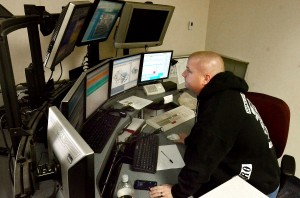


Jim Kenny, of Galloway, works dispatching at the Galloway Police Department on Tuesday, Nov. 1.
Posted: Sunday, November 6, 2011 6:34 pm
By JENNIFER BOGDAN Staff Writer pressofAtlanticCity.com
When Galloway Township agreed to provide dispatch services for Mullica Township in May, the employees taking on the additional workload were told by township officials they would receive $2,000 stipends.
To this point, eight affected dispatchers have not yet been paid, and may not receive the....Continue Reading
advances at all. Township officials say the issue is now being discussed with the head of the International Brotherhood of Electrical Workers Local 210, the union that represents the workers.

Trish Poletis, of Galloway, works dispatching at the Galloway Police Department on Tuesday, Nov. 1.
Senior dispatcher Jim Kenny said he and the other employees involved — who originally wanted $2,500 stipends — are only asking for what they thought was already agreed upon. The increased workload is significant. Under the agreement, call volume is expected to increase about 50 percent.
“We’re just trying to fight for what we feel is right. We don’t understand because we’re doing additional work of another whole town,” Kenny said. “Now all of a sudden, (the township) is refusing to release the money to us.”
The two municipalities signed a five-year agreement in May after Mullica Township’s previous dispatch provider shut down. Under the contract, Mullica Township agreed to pay Galloway Township $195,000 for the first year’s services with incremental cost-of-living increases for the subsequent four years.
Despite negotiations that began in September 2010 under former Galloway Township Manager Roger Tees, no language locking in the payment arrangement was included in the shared-services agreement approved by Township Council on May 24. Acting Galloway Township Manager Steve Bonanni, who came on board in February, said details as to how the $195,000 would be spent by the township weren’t included in the final version of the written agreement because he didn’t think it was necessary or appropriate to do so.
“That money could be used for whatever we want it to be used for. I had some hesitation with including stipends because the goal with these interlocal agreements was to save money,” Bonanni said. “(The dispatchers) are still working an eight-hour day.”

Kristi McCabe, of Lower Township, left, and Trish Poletis, of Galloway, work in dispatching at the Galloway Police Department. Tuesday, Nov. 1, 2011
Hamilton Township recently began providing dispatch
services for Egg Harbor City, and those dispatchers did not receive stipends, he said.
Galloway Township Police Chief Pat Moran was assigned to create a work group to determine the costs of the shared-services arrangement under Tees’ leadership. That work group included Capt. Allan Kane, dispatchers and technology workers. It did not include Local 210 business manager Charlie Hill.
In a Jan. 5 letter to Tees, Moran recommended “that the present staff receive an additional $2,000 each for the added responsibility, to be placed into their salary as a stipend.” The township currently employs 11 dispatchers and plans to hire one more, but discussions of stipends were said only to apply to those already employed when the shared services agreement was signed. Eight dispatchers from that time remain employed at the center.
“The final resolution did not include the specific line items. After the agreement was made, the payment of the stipends was discussed and there became an issue with the union,” said Moran, who noted those issues are being resolved between the township and the union, but he is no longer involved
The township had been handling about 30,000 calls a year, Moran said. Adding in Mullica Township should amount to between 14,000 and 17,000 additional calls each year — about a 50 percent increase in call volume at the dispatch center, located in the municipal complex on Jimmie Leeds Road.
“The dispatchers were assigned additional duties. One call isn’t like a phone call. It could mean two ambulances, a helicopter, two or three fire companies and several police units dispatched,” Moran said. “No call is ordinary.”
An average motor-vehicle incident with injuries consumes 45 minutes to an hour for a dispatcher, Moran said.
Local 210 represents about 55 white-collar workers, many of whom were furloughed — along with members of Local 68 and Local 676 — for about a year beginning in March 2010, when the township opted to use the move to help close a $2 million budget gap. The dispatchers, who all belong to Local 210, were not furloughed because their job function was deemed essential — a development that caused a rift in the union, Kenny said.
Local 210 filed a grievance over the missed work days with the Public Employment Relations Commission. After a commission arbitrator ruled in the union’s favor in March, Galloway Township and the unions agreed to an arrangement ending the furloughs and allowing the 50 affected employees to return to work.
The employees were not paid back wages for the 47 missed days and agreed to a pay freeze in 2011 and a 1 percent pay increase in 2012. The township agreed that no union layoffs would be imposed in 2011 or 2012. The township has a right to furlough employees in all three unions for as many as 12 days in 2012.
The township is struggling as it prepares for the 2012 budget, particularly since it has already paid out over $500,000 in tax appeals from its $675,000 reserve.
“The revenues are so bad that giving out the stipends would be a slap in the face,” said Bonanni, who also noted that the $16,000 worth of stipends in question could be applied to higher-than-expected health insurance costs for the new dispatchers hired as a result of the agreement.
Councilman Tony Coppola said he has great respect for what the dispatchers do, but said it would be difficult to award stipends to select employees this year. He never would have suggested the idea of stipends in negotiations, he said.
“The idea of shared services is to consolidate effectively and save money,” Coppola said. “With incrased health insurance costs. We’re saving as much money as we’d originally planned.”
The dispatchers argue that the money for the stipends was calculated into the agreement, so the advances shouldn’t cost the township anything.
“I don’t know what our recourse will be if we don’t get the money. To be honest, a lot of us can’t afford a lawyer,” Kenny said.
Contact Jennifer Bogdan
609-272-7239
JBogdan@pressofac.com










